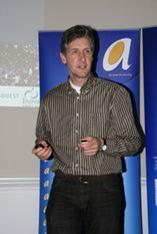
The EU is in danger of being sidelined and its global market will become closed, as developing countries develop serious technology to combat feeding their hungry populations, according to Agrovista’s Loen Jahae.
The provider of specialist agronomy and crop protection products held a Fruit Spring Briefing Meeting in Ashford, Kent, last week, and discussed the ways biotechnology and genetically modified technology could help European top-fruit growers in the future.
“We have to reduce pesticide levels and are constantly pressured from consumers to do so,” said Jahae. “But, the population is set to double by 2050, and we would have to treble world food production to feed everyone. GM has not been addressed as it should and there are a number of things we can be looking into for the future.”
Dutch company Plant Research International’s (PRI) Henk Schouten talked industry members through leading research he is taking part in to engineer apples that are resistant to apple scab to reduce the use of pesticides and therefore residues using Cisgenesis, rather than Transgenesis.
Schouten explained that through natural selection it took up to 50 years to develop an apple that has a resistant gene to apple scab and also produces good quality, for the apple scab to break the barriers and attack again after 10 years of commercial production.
He said: “Evolution broke the resistance gene down, so half a century’s work was broken in just a decade in the Netherlands. Now theses apples need to be sprayed, as the fungus only needs one way, or one key, to enter the gene.
“What we needed to develop was an accumulation of different locks in one cultivar. It is feasible and needs breeding, but through classical breeding it is going to take a long time.
“For long lasting protection we can extract the wanted resistant from the DNA and bring this gene to a high-quality cultivar, which is what we call cisgensis.”
Cisgenesis is the genetic modification of a recipient plant with a natural gene from a crossable and sexually compatible plant. Schouten ensured delegates that the inserted gene must be complete and natural, and that this process could have been engineered through natural selection, but cisgensis accelerates this.
“It is similar to the old-fashioned transgenesis, but it isn’t using genes from other vegetables or plants,” added Schouten. “It is a natural process that has been accelerated. It is not a case of adding foreign genes to a crop, so other wild plants cannot be pollinated and cause possible unwanted changes on the landscape. Cisgenesis is safe for the environment; at least as safe as classical breeding or natural selection.
“Cisgenesis uses GM as a tool and its plants are regarded as GM. Approval for GM is very time consuming and expensive, but we are pushing it forward and are waiting for the outcome of a GMO registration from Brussels. So, we will be able to prevent the end of the apple industry for the Netherlands.”
PRI is also working on apples that are resistant to mildew and fire blight. It aims to present a Cisgenesis engineered apple to the Netherlands’ market by 2012.